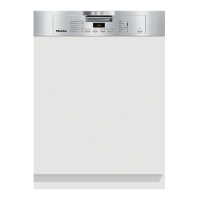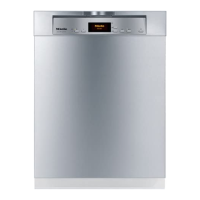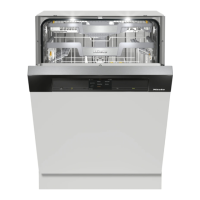Do you have a question about the Miele G 1102 SCi and is the answer not in the manual?
Provides a diagram and labels of the dishwasher's main components and their locations.
Explains the functions and indicators of the dishwasher's control panel.
Details precautions and risks related to children interacting with the dishwasher.
Specifies the intended use of the dishwasher and limitations.
Outlines safety measures related to electrical connections, installation, and placement.
Warns against unauthorized repairs and specifies using Miele-approved technicians and parts.
Provides guidance on the correct installation procedures for the dishwasher.
Lists important rules for operating the dishwasher safely and effectively.
Instructs on how to safely disable and dispose of an old appliance.
Details the environmentally friendly materials used for packaging and their disposal.
Explains responsible disposal methods for old electrical appliances.
Offers tips and recommendations for economical water and electricity usage during washing cycles.
Details how to operate the safety lock to prevent children from opening the door.
Explains the function of the water softener and the need to program it based on local water hardness.
Provides step-by-step instructions for setting the water hardness level on the appliance.
Details how to verify the currently set water hardness level on the dishwasher.
Guides the user on how to correctly fill the salt reservoir for the water softener.
Explains the function of the salt indicator light and how to respond when it illuminates.
Explains the purpose of rinse aid and how it is dispensed automatically.
Details the process for opening the rinse aid dispenser and filling it.
Describes the rinse aid indicator light and when to refill the reservoir.
Instructs on how to adjust the amount of rinse aid dispensed for optimal results.
Offers specific advice on positioning various types of crockery for optimal cleaning and drying.
Lists types of items that should not be cleaned in the dishwasher due to potential damage.
Provides specific advice regarding the cleaning of silverware and items with sulphur content.
Details how to load the upper basket with small, lightweight, and delicate items.
Explains how to use the hinged cup rack to accommodate taller items.
Provides instructions on adjusting the height of the upper basket for better loading flexibility.
Guides on loading larger and heavier items into the lower basket.
Explains how to lower the hinged spikes in the basket to create more space.
Details how to remove and replace a spiked insert for accommodating larger items.
Describes the use of the bottle holder for washing narrow items like baby bottles.
Provides instructions on how to arrange cutlery in the tray for efficient unloading.
Explains types of detergents, their active ingredients, and how to use them.
Gives instructions on the correct amount and method for dispensing detergent.
Details the process of opening the detergent dispenser and adding detergent.
Guides the user on how to choose the appropriate wash programme.
Explains how to initiate a selected wash programme.
Describes the indicator lights that show the current stage of the wash programme.
Provides instructions on how to safely unload the dishwasher after a cycle.
Details the procedure for switching off the dishwasher after use.
Explains how to pause and resume a running wash programme.
Guides on how to switch to a different programme while one is already in progress.
Explains how to reset the dishwasher's settings back to their original factory defaults.
Details how to clean the door seals and the door front for hygiene and appearance.
Lists cleaning agents and tools to avoid for maintaining the dishwasher's external surfaces.
Explains how to locate, remove, and clean the filter combination in the wash cabinet.
Details how to correctly re-insert and lock the filter combination after cleaning.
Guides on how to remove, clean, and reattach the spray arms to ensure proper function.
Lists common technical issues, their possible causes, and recommended remedies.
Addresses simultaneous flashing of Wash/Rinse, Drying, and End indicators as a technical fault.
Covers issues related to the dishwasher not filling or draining properly.
Addresses common operational issues like detergent residue or moisture inside the appliance.
Identifies causes of unusual noises during operation and provides solutions.
Details potential causes and remedies for dishes not being clean or having smears.
Explains why dishes may not be dry or may have flecks, and how to resolve it.
Addresses the issue of white residue or clouding on dishes and its causes.
Covers glassware discolouration, rust on cutlery, and specific stain removal challenges.
Details how to clean the filter in the water inlet hose to ensure adequate water supply.
Provides instructions for cleaning the drain pump and non-return valve if water is not pumped out.
Advises on contacting Miele service for faults that cannot be remedied by the user.
Explains the programme update function for appliance electronics.
Provides information on obtaining comparative test data and noise level measurements.
Helps users select the appropriate programme based on crockery type and food deposit.
Lists the specific detergent amounts or types needed for each wash programme.
Details the sequence of operations, including pre-wash, main wash, rinses, and drying for each programme.
Outlines the energy and water consumption, and duration for each programme.
Suggests optional accessories to enhance the dishwasher's functionality for specific needs.
Provides safety instructions and requirements for electrical connection in the UK.
Details safety guidelines for replacing fuses in BS 1363 plugs.
Explains the function of the integrated waterproof anti-leak system for preventing water damage.
Provides guidelines for connecting the dishwasher to the water supply, including pressure and hose requirements.
Describes the appliance's drainage system, hose specifications, and extension possibilities.
Explains the necessity and procedure for venting the drainage system to prevent siphoning.
| Brand | Miele |
|---|---|
| Model | G 1102 SCi |
| Category | Dishwasher |
| Language | English |











